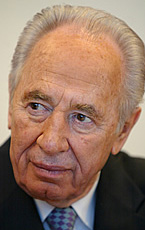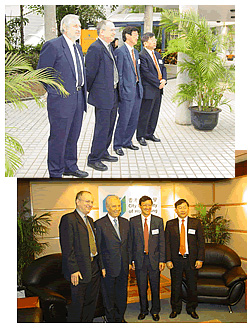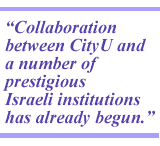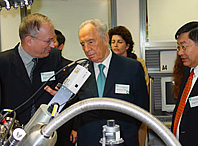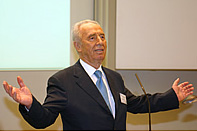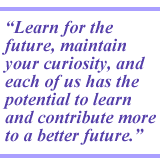The future is already knocking on our door in the guise of nanotechnology, and Mr Shimon Peres has the vision to open that door. "Today's Advancements — Tomorrow's Future, The Role of Economic, Technological and Scientific Development in Today's World" was the title of a lecture by Mr Shimon Peres, Israel's Former Prime Minister and Nobel Peace Laureate, delivered at City University of Hong Kong, the morning of 5 March. He also toured the University's laboratories.
Mr Shimon Peres, the former Prime Minister of Israel (1984-1986 and 1995-1996) won the Nobel Peace Prize in 1994. In 1996, he founded the
Peres Center for Peace, for the promotion of peace in the
Middle East. Because of his interest in nanotechnology, Mr Peres decided to pay a visit to CityU in addition to giving a talk to members of the Jewish community in Hong Kong, in connection with the
United Israel Appeal—a principal link between the American Jewish community and the people of Israel, which supports projects such as helping victims of terrorism and providing education for the poor.
Mr Peres sees nanotechnology playing a vital, global role in the future. His primary concern, at present, is the potential benefit nanotechnology offers Israel—for water purification, building in the Negev desert, and homeland security. Nanotechnology deals with the manipulation of nanosize
(tiny) objects, atoms and molecules to produce materials devices and machines. This manufacturing technology will make most products lighter, stronger, cleaner, and more precise. In following developments in nanoscience and nanotechnology, Mr Peres became aware of CityU's success in these areas.
Mr Peres was greeted by Acting President Professor David Tong, along with Professor Y Lifshitz, Adjunct Professor, and Professors S T Lee and I Bello of the Department of Physics and Materials Science. Professor Tong briefly introduced the history of CityU to Mr Peres, with some information about the Faculties. "Can you combine 'Humanity' and 'Business'?" Mr Peres quipped.
The nanotechnology revolution has begun
Professor Lee gave a presentation on "Nanotechnology in Greater China & CityU" touching upon the remarkable progress C
ityU scientists have made. He highlighted a number of their achievements, including publishing over 130 papers on nanoscience and nanotechnology (five in
Science and
Nature magazines), filing four US patents, pioneering the lasing of nanowires and nanoribbons, and being the first to report the smallest carbon nanotubes. "In fact," Professor
Lee noted, "collaboration between CityU and a number of prestigious Israeli institutions, such as
Bar-IlanUniversity, Technion and the Hebrew University of Jerusalem, has already begun—eight funded projects are currently under way." CityU hopes to strengthen these collaborative ties and promote the exchange of scientists and research students between
Israel and
Hong Kong.
The presentation was followed by a tour of the University's laboratories, where Mr Peres was invited to take a close look at products such as the nanowire and Organic Light-Emitting Diode (OLED) devices. Mr Peres lingered over each item, listening intently to the researchers' descriptions and explanations.
Humanitarian concerns at heart
Mr Peres' visit culminated in the Special Distinguished Lecture he delivered to a packed lecture theatre of more than 350 students, staff and staff family members, despite unprecedented security. The 30-minute talk, "Today's Advancements – Tomorrow's Future, The Role of Economic, Technological and Scientific
Development in Today's World," was an intellectual traverse across a spectrum of Mr Peres' humanitarian concerns. These are, as summarized by Professor Tong, who served as moderator: war and peace, science and technology,
Israel and
Palestine, development and progress, love and marriage (even sex).
Dousing his lecture with wit and anecdotes, Mr Peres began by saying he was impressed by the nanotechnology research and development at CityU. Nanotechnology, the greatest major breakthrough in science and technology of late, he believes, will help solve the problem of resources scarcity and depletion. "Science will bring new horizons," he said, "and the pursuit of human development through advances in science and technology is one of the three major revolutions in society." The other two he mentioned were globalization and the "liberalization of women," which helped shape the world today.
At the end of the lecture, he urged students and staff to continue to learn more for a better world. After the lecture, Mr Peres answered questions from the enthusiastic audience, on topics ranging from
Hong Kong and
China, patriotism and democracy, and science and technology, to their impact on the development of society.
An Israeli Member of Parliament (Knesset) from 1959 and from 1970, Mr Peres held ministerial posts including Minister of Foreign Affairs, Minister of Defence and Minister of Finance. His status as a highly regarded international statesman, speaker and visionary was recently acknowledged at his 80th birthday event, attended by many leaders who shaped the 20th century, such as Bill Clinton and Mikhail Gorbachev.
Peter Ho contributed to this article.
